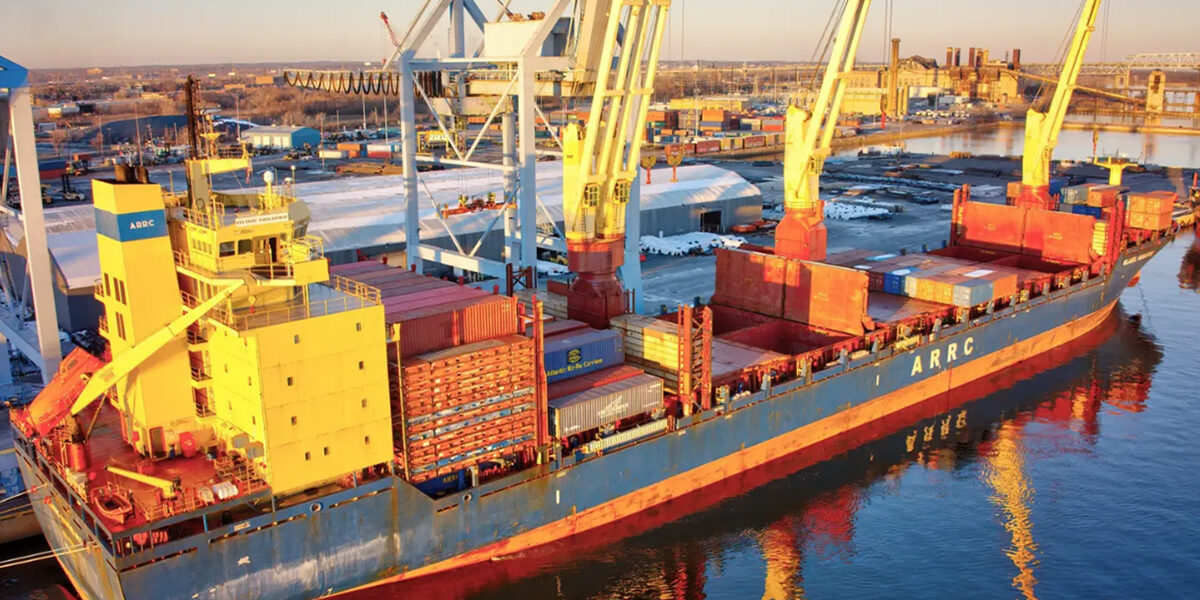The ship, 23000-tonne Atlantic Navigator II, was en-route from St Petersburg in Russia to the US east coast when it developed a fault and was forced to dock at Rostock port on the German Baltic coast earlier this month. Earthsight learned of the action through industry sources; it was then confirmed by German Customs.
Russian timber was banned in Europe in response to the Russian invasion of Ukraine in February 2022. The timber industry is one of the largest sources of government revenue in Russia after oil and gas. All forests in the country are state-owned, some of them by the military, and many of the largest timber companies are owned by billionaire oligarchs close to Putin. Though the UK and EU have banned Russian wood, the US has so far failed to follow suit, despite calls for it to do so by the Ukrainian Parliament.
The vessel is one of a small fleet operated by a Canadian-owned shipping firm, Atlantic Ro-Ro Carriers (ARRC), which ply back and forth between Russia and the US, their cargoes almost entirely made up of Russian birch ply. US import records analysed by Earthsight show that the Atlantic Navigator II offloaded 9399 cubic metres of such ply at US ports in October 2023, and a further 5876 cubic metres in December 2023. The vessel halted at Rostock is believed to be carrying a similar quantity on this occasion. Such an amount of plywood, when sold at retail, is worth an estimated €40 million. Laid out, the plywood could cover an area as large as 200 football fields.
According to Earthsight’s sources, German Customs have placed a ‘hold’ on the ship due to alleged violation of EU sanctions relating to the plywood on board. ARRC’s lawyers argued that the vessel’s cargo should be exempt, because it only docked in German due to an emergency. German Customs have rejected that argument, and ARRC is now set to appeal.
When it last took this journey, 161 of the 192 shipping containers on board were filled with birch plywood. Thirteen of those were plywood supplied by Russian timber giant Sveza, which is part-owned by Alexei Mordashov, Russia’s richest man. Mordashov, who is the subject of EU and US sanctions, was among a select group of oligarchs who met with Putin on the day of the invasion. He has been called ‘Putin’s banker’ as a result of another of his firms, [insert bank].
Our sources indicate that there is at least 650 cubic metres of plywood from Sveza on board the vessel this time – as much as 10 per cent of the cargo.
“This is the largest cross-border seizure of illegal wood I have ever come across”, said Earthsight’s Director, Sam Lawson, who has been studying the international trade in illegal timber for 25 years.
Petro Testov, a Ukrainian campaigner who led the call to ban Russian wood following the invasion, a call which was supported by 130 NGOs from around the world, said: “It is essential that German authorities stand firm, and prosecute this case to the fullest extent of the law. This blood-timber should be sold and the proceeds donated to Ukrainian humanitarian causes.”
US Presidential Executive Order XXXX of XXX, which banned other Russian commodities like diamonds but omitted timber, empowers the US Treasury Secretary to add further items to the list without the requirement of additional legislation. In its latest round of sanctions, passed in the wake of the murder of Russian dissident Alexey Navalny, calls for the inclusion of Russian wood went ignored by the Biden Administration again.
“This continued failure to act by the US government is shameful. They must stop profiting from this trade and finally ban Russian wood. We have waited too long”, Testov said.
Photo Atlantic Navigator II offloading Russian plywood at Philadelphia, 2022







